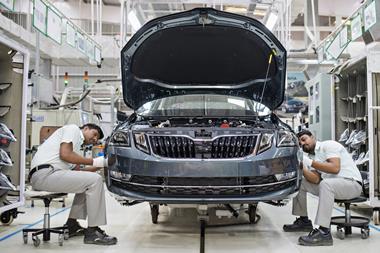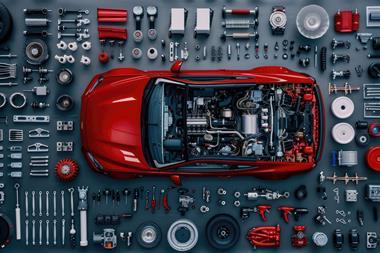ABB’s IRB 6600 robots are available with a choice of fi ve handling/ reach capacities: 175kg/2.55m, 225kg/2.55 m, 175kg/2.8m, 125kg/3.2m, and 200kg/2.75m. The IRB 6600 is suitable for various process applications, including spotwelding, material handling and machine tending. In addition, a range of software products - all falling under the umbrella designation of Active Safety – are available to protect personnel, the robot and other peripheral equipment. The robot is equipped with the BaseWare operating system, which controls aspects of robot function including motion control, development and execution of application programs, communication, etc. For additional functionality, the robot can be equipped with optional software for specific application support, including spot welding, communication features (network communication) and advanced functions such as multi-tasking, sensor control, etc.
Declining orders have badly affected Tier suppliers based in the UK, but despite the uncertainty, companies risk becoming uncompetitive if they choose not to invest in automation equipment.
With cash in short supply and a perceived need to maximise short-term returns, many suppliers delivering parts and modules to OEM carmakers are often unwilling to consider additional investment in capital equipment. Despite the current situation, this might be best time for Tier One subcomponent suppliers to investment in automation equipment, as improved efficiencies and reduced cost-perpart figures could serve to secure additional orders over competing companies.
Magna Exteriors and Interiors manufactures interior trim components, delivering cockpit modules and instrument panels to many OEM carmakers with UK-operations.
As part of Magna International, one of the most diverse automotive suppliers in the world, the company is constantly looking to improve its internal processes in order to remain competitive in relation to suppliers of similar content. Investment in robot-based automation has expanded the company’s capacity and increased manufacturing efficiency in many of the company’s module assembly processes. Working together with ABB’s channel partner Geku Limited, a company renowned for its extensive experience as a system integrator in the field of robotic technology, Magna has fully-automated the insert loading, moulding removal and quality assurance processes associated with producing large mouldings on a ‘just in time’ basis to companies including Jaguar, Land Rover and Honda.
In order to improve manufacturing efficiencies across its cockpit modules, Magna Exteriors and Interiors has introduced ABB’s IRB 6600 six-axis robots to perform multiple tasks such as machine tending and handling, insertion and inspection of the product being delivered directly from the 2,700 tonne, state-of-the-art injection moulding machines which produce a finished mould approximately every minute.
With the use of the ABB equipment, Magna has been able to significantly increase its productivity when running at full capacity. This is largely due to the robots being able to handle the product immediately upon ejection from the moulding equipment, manipulating the still-hot parts in order to perform the twenty-point inspection test in cycle before the next moulding is produced – a task that would be impossible using manual inspection techniques. Once the robot has completed the inspection check, the product is then transported by conveyor to an area where workers manually trim any remaining sprues.

The robots further offer quick tool-change capabilities, a feature which allows the robot to accommodate the full range of grippers required for the handling of each different cockpit modules, which range from plain to fully-grained and unique ‘soft texture definition’ finishes. Additionally, some of interior modules incorporate a specialised, threelayer composite process, specified for a major UK OEM, which without the flexibility of the ABB robots would be virtually impossible to handle automatically.
Nigel Richardson of Geku comments: “Our close proximity to Magna was an obvious logistics advantage, but I think that the technical solution we offered played an important part in securing the order. This is a safetycritical part and we had to guarantee consistency of process to ensure that in the airbag area, only one mesh was ever inserted into the tool.”
Richardson continues: “We did this by first designing and building a reliable mesh de-stacking system which had an independent pick up from the robot. As an extra security measure, the mesh was accurately gauged after separation from the stack to check that only one had been collected. Then, in a post-mould operation, a vision inspection system was used to ensure that the mesh was moulded in the correct place with the right features; the combination of all these things ensured a robust and secure process. Once the first system was proven, Magna quickly ordered a second virtually identical system, so this proved the level of confidence they had in the process we had developed.” Roger Larcombe, Engineering Manager at Magna explains, “We are always aiming for the ‘best in class’ manufacturing techniques due to the specialised processes we engineer and perform within out factory. We have numerous applications that require minute attention to detail, such as the specialised embedding of reinforcing mesh on to the back of the instrument panel mouldings and the accuracy of our laser perforation for airbag safety release. This is why investment in the latest technology is paramount, in order to be able to meet our customers’ expectations.”
Magna Exteriors and Interiors has been using industrial robots for over 25 years, so has a significant number of robots on  site. “Around our factory we have other ABB robots performing tasks such as routing, milling and ultrasonic heat staking. These have significantly reduced our tooling and maintenance costs. Our staff skill levels have also developed and our engineers are proficient in working with robots and some of the tasks now being performed by robots have also increased our levels of health and safety,” explains Larcombe.
site. “Around our factory we have other ABB robots performing tasks such as routing, milling and ultrasonic heat staking. These have significantly reduced our tooling and maintenance costs. Our staff skill levels have also developed and our engineers are proficient in working with robots and some of the tasks now being performed by robots have also increased our levels of health and safety,” explains Larcombe.
Even with its skilled maintenance team, Magna still supplements its own support function with an ABB service agreement, including the new Remote Service Monitoring technology, where a robot’s ‘health’ can be monitored by ABB while still in active production.
Mike Badger, ABB Account Manager, summarises the situation. “This is an example of an experienced local robot integrator meeting the needs of a major Tier 1 supplier through implementation of the latest robot technology, together with a close working relationship.”


































